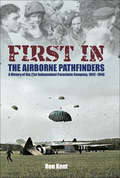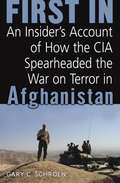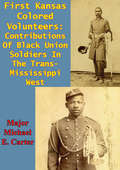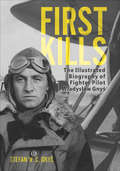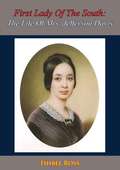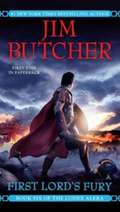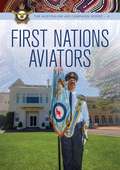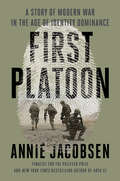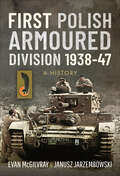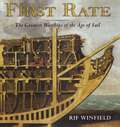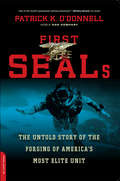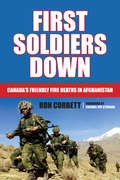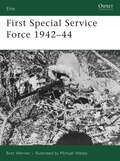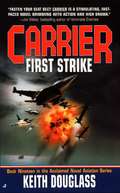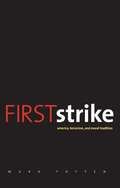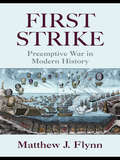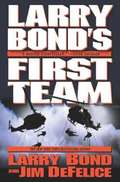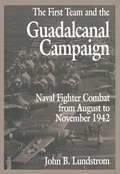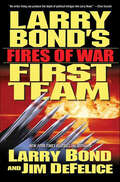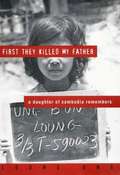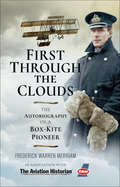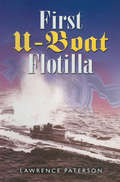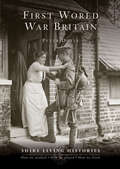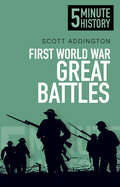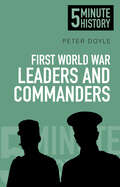- Table View
- List View
First In: A History of the 21st Independent Parachute Company, 1942–1946
by Ron KentThe First World War as a living history is to all intents and purposes over. As of today February 2005, there are only twelve veterans from six million alive who served on the Western Front. Richard has spent the last 20 years interviewing and carefully recording the memories of over 270 veterans and this book is a culmination of his 20 years of work.The book will be an extraordinary collection of stories told by the veterans themselves but also through the author's memories of them: the remarkable, the sad, the funny, the moving. It will also feature an outstanding collection of photographs taken of the veterans as they were, as soldiers during the war together with recent images of almost all of these men, taken at home, back on the Western Front, at the final veterans' reunion, and at various investitures. Britain's Last Tommies will also offer a unique list of veterans, all of who individually hold the poignant title of being the last Gallipoli veteran, the last Royal Flying Corps veteran, the last Distinguished Conduct Medal holder, the last cavalryman, the last Prisoner of War.
First In: An Insider's Account of How the CIA Spearheaded the War on Terror in Afghanistan
by Gary C. SchroenIn the days following 9/11, a small group of CIA agents covertly began to change history. This is the riveting first-person account of the harrowing top-secret mission inside Afghanistan to set the stage for the defeat of the Taliban and launch the war on terror. After 9/11, the author was drafted back for his most dangerous assignment: to lead a handpicked team of operatives deep into Afghan territory and prepare the way for an American assault.
First Kansas Colored Volunteers: Contributions Of Black Union Soldiers In The Trans-Mississippi West
by Major Michael E. CarterOver one hundred and eighty thousand black men fought for the Union during America's Civil War. From infantrymen, to artillerist and cavalry soldiers, these soldiers combined to form one hundred and sixty-six Union regiments. On 29 October 1862 at Island Mound, Missouri, the First Kansas Colored Volunteers, an infantry regiment comprised mainly of blacks from Kansas and Missouri, became the first black regiment to experience combat during the Civil War. Their courage and outstanding performance in battle, as recorded, are unquestioned. What have been omitted from research thus far are their contributions to overall Union successes in the Trans-Mississippi West. Their accomplishments are remarkable, for they came in the face of extreme obstacles of prejudice and hatred. "No Quarter" was ever given and "No Quarter" was asked of the regiment's black soldiers. The contributions of the First Kansas Colored Volunteers, in conjunction with those of the many regiments they served alongside of, resulted in a resounding Union victory in the Trans-Mississippi West.
First Kills: The Illustrated Biography of Fighter Pilot Wladyslaw Gnys
by Stefan W. Gnys&“Remarkably detailed . . . It is a tribute to Wladyslaw Gnys, the decorated ace pilot, but also to the charming and humble man himself.&” —Hamilton Magazine Polish pilot Wladyslaw (Wladek) Gnys was credited with shooting down the first two German aircraft of World War II on September 1, 1939. On this day, as Gnys&’ squadron took off near Kraków to intercept the German invaders, German Stuka pilot Frank Neubert attacked, killing the captain. Wladek, who barely survived himself, evaded the pursuing Stukas and went on to make the first Allied kills, while Neubert was credited with the first aerial kill of the war. Fifty years after the invasion of Poland, in the summer of 1989, Gnys and Neubert met and shook hands, making news around the world. They reconciled their differences and remained friends until their deaths. This event symbolized the prevailing friendly coexistence between Poland and Germany. Written by his son Stefan and drawing from his logbooks, this highly illustrated biography of Wladek Gnys is the most in-depth account of the Polish hero&’s life. It tells Wladek&’s story from his childhood in rural Poland, through his time flying in three Allied air forces during World War II, his capture and escape during Operation Overlord, and his reconciliation with Neubert and his commemoration as a national war hero in Poland. &“Tells the story of one man&’s ride through the history of most of the 20th century . . . This is far from a run-of-the-mill wartime story, being more of a touching and revealing look into an extraordinary life.&” —Aircrew Remembered
First Lady Of The South: The Life Of Mrs. Jefferson Davis
by Ishbel RossThis brilliant and engaging biography of Varina Davis tells of the early days of her marriage to Jefferson Davis, the controversial figure who would become president of the Confederacy. The story gives a detailed account of their life in Washington and Richmond, the years of war, and follows their journey during the weeks and months of escape and then--following Jefferson Davis' release from prison--exile."EVERY move the made was noticed and commented on. She was accused of being friendly to the North, of harboring spies in her home, of feasting when others starred, of pretentious ways, of nepotism, of not reading the books which she quoted so freely, of extravagant entertaining in hours of crisis, and of meddling in politics and military affairs. Some of the stories were true; many were not, but it is self-evident that she instinctively generated heat lightning around her."--First Lady of the South.Includes numerous illustrations.
First Lord's Fury (Codex Alera #6)
by Jim ButcherFor Gaius Octavian, life has been one long battle. Now, the end of all he fought for is close at hand. The brutal, dreaded Vord are on the march against Alera. And perhaps for the final time, Gaius Octavian and his legions must stand against the enemies of his people. And it will take all his intelligence, ingenuity, and furycraft to save their world from eternal darkness.From the Paperback edition.
First Nations Aviators
by RAAF History and Heritage BranchThe inaugural Royal Australian Air Force Oral Histories series publication, First Nations Aviators, will introduce you to a number of First Nations People who have proudly served the Air Force, in various capacities, from the Second World War through to today. Albeit brief, their stories are particularly inspirational considering the discrimination that occurred on enlistment, and their treatment after separating from the Armed Services, at that time. Their stories should help to reveal and acknowledge those First Nations People for the heroes that they are and the recognition that their families are due. First Nations Aviators provides the perfect backdrop to introduce this series as we start with &‘First Nations People&’, the very people who have already been protecting Australia and its interests for more than sixty thousand years!
First Platoon: A Story of Modern War in the Age of Identity Dominance
by Annie JacobsenAn urgent investigation into warfare, good, and evil in the age of biometrics, the technology that would allow the government to identify anyone, anywhere, at any time This is a story that starts off close and goes very big. The initial part of the story might sound familiar at first: It is about a platoon of mostly nineteen-year-old boys sent to Afghanistan, and an experience that ends abruptly in catastrophe. Their part of the story folds into the next: inexorably linked to those soldiers and never comprehensively reported before is the U.S. Department of Defense&’s quest to build the world&’s most powerful biometrics database, with the power to identify, monitor, catalogue, and police people all over the world. First Platoon is an American saga that illuminates a transformation of society made possible by this new technology. Part war story, part legal drama, it is about identity in the age of identification. About humanity—physical bravery, trauma, PTSD, a yearning to do right and good—in the age of biometrics, which reduce people to iris scans, fingerprint scans, voice patterning, detection by odor, gait, and more. And about the power of point-of-view in a burgeoning surveillance state. Based on hundreds of formerly classified documents, FOIA requests, and exclusive interviews, First Platoon is an investigative exposé by a master chronicler of government secrets. First Platoon reveals a post–9/11 Pentagon whose identification machines have grown more capable than the humans who must make sense of them. A Pentagon so powerful it can cover up its own internal mistakes in pursuit of endless wars. And a people at its mercy, in its last moments before a fundamental change so complete it might be impossible to take back.
First Polish Armoured Division 1938–47: A History
by Evan McGilvray Janusz JarzembowskiThe First Polish armored Division was formed in Scotland in February 1942 from Polish exiles who had escaped first Poland and then France. Its commander, Stanislaw Maczek, and many of its men had previously served in Polish 10th Motorized Cavalry Brigade (10 BKS), which had taken part in the Polish invasion of Czechoslovakia in 1938 and given a good account of itself in the defense of Poland against German and Soviet invasion of 1939. Under Maczek’s leadership the division was trained and equipped along British lines in preparation for the invasion of France. Attached to 1st Canadian Army, the division was sent to Normandy in late July 1944. It suffered heavily during Operation Totalize but went on to play a crucial role in preventing an orderly German withdrawal from the Falaise Pocket by its stand at Hill 262. They then played their part in the advance across Western Europe and into Germany. This detailed history, supported by dozens of archive photos, concludes by looking at the often-poor treatment of Maczek and his men after the war.
First Rate: The Greatest Warships in the Age of Sail
by Rif WinfieldIn the sailing era First Rates were the largest, most powerful and most costly ships to construct, maintain and operate. Built to the highest standards, they were lavishly decorated and given carefully considered names that reflected the pride and prestige of their country. They were the very embodiment of national power, and as such drew the attention of artists, engravers and printmakers. This means that virtually every British First Rate from the Prince Royal of 1610 to the end of sail is represented by an array of paintings, drawings, models or plans.This book is a celebration of these magnificent ships, combining an authoritative history of their development with reproductions of many of the best (and least familiar) images of the ships, chosen for their accuracy, detail and sheer visual power in an extra-large format that does full justice to the images themselves. It also includes comparative data on similar vessels in other navies, so it is a book that everyone with an interest in wooden warships will find both enlightening and a pleasure to peruse.
First SEALs: The Untold Story of the Forging of America's Most Elite Unit
by Patrick K. O'DonnellFrom bestselling author Patrick K. O'Donnell, the untold story of World War II's first unit of special operations combat swimmers-precursors of today's US Navy SEALs
First Soldiers Down: Canada's Friendly Fire Deaths in Afghanistan
by Ron Corbett Colonel Pat StogranOn April 18, 2002, "friendly fire" killed four Canadian soldiers in Afghanistan, Canada’s first combat deaths since the Korean War. On April 18, 2002, Alpha Company, Third Battalion of the Princess Patricia’s Canadian Light Infantry, was on a training exercise at Tarnak Farms, a former Taliban artillery range in southern Afghanistan. The exercise had been underway for nearly seven hours when two American fighter pilots flew overhead. One, Major Harry Schmidt, saw the artillery fire below, and thinking he was under attack, dropped a laser-guided bomb.Four Canadian soldiers died that night, the first Canadian combat fatalities since the Korean War. For many in Canada the tragedy signalled the true beginning of Canada’s lengthy combat mission in Afghanistan.First Soldiers Down recounts what happened that evening through archival material and the recollections of troops. It also tells the personal stories of the fallen Sergeant Marc Lger, Corporal Ainsworth Dyer, Private Richard Green, and Private Nathan Smith as well as what happened to the loved ones of each of the four in the decade since the incident.
First Special Service Force 1942-44
by Michael Welply Bret WernerThis is a concise history of the unique integrated commando-style brigade of US and Canadian volunteers formed in 1942. Hand picked, and trained in airborne, amphibious, mountain and winter warfare, demolitions and close-quarter tactics, they left a combat legacy still recognized amongst today's Special Forces. This book explores the remarkable results the FSSF achieved in Italy - in the harsh mountain fighting on the Winter Line, in the trenches of Anzio, and in the breakthrough to Rome. Accompanied by unique combat photography and illustrations of their distinctive uniforms, this is an insight into a famous, but little explored unit.
First Strike (Carrier #19)
by Keith DouglassRussian radicals refuse to end the Cold War without a bang-a nuclear one. But Tombstone MacGruder and the Carrier Battle Group will see the U.S. attacked...when hell freezes over.
First Strike: America, Terrorism, and Moral Tradition
by Mark TottenCan the use of force first against a less-than-imminent threat be both morally acceptable and consistent with American values? In this timely book Mark Totten offers the first in-depth, historical examination of the use of preemptive and preventive force through the lens of the just war tradition. Although critical of the American incursion into Iraq as a so-called "preemptive war," Totten argues that the new terrorist threat nonetheless demands careful consideration of when the first use of force is legitimate. The moral tradition, he concludes, provides a principled way forward that reconciles American values and the demands of security.
First Strike: Preemptive War in Modern History
by Matthew J. FlynnPreemptive warfare is the practice of attempting to avoid an enemy’s seemingly imminent attack by taking military action against them first. It is undertaken in self-defense. Preemptive war is often confused with preventive war, which is an attack launched to defeat a potential opponent and is an act of aggression. Preemptive war is thought to be justified and honorable, while preventive war violates international law. In the real world, the distinction between the two is highly contested. In First Strike, Matthew J. Flynn examines case studies of preemptive war throughout history, from Napoleonic France to the American Civil War, and from Hitler’s Germany to the recent U.S. invasion of Iraq. Flynn takes an analytical look at the international use of military and political preemption throughout the last two hundred years of western history, to show how George W. Bush’s recent use of this dubiously "honorable" way of making war is really just the latest of a long line of previously failed attempts. Balanced and historically grounded, First Strike provides a comprehensive history of one of the most controversial military strategies in the history of international foreign policy.
First Team (First Team #1)
by Larry Bond Jim DefeliceSpecial team composed of the CIA and military special forces track missing nuclear waste being used by terrorists to convert a 747 into a dirty headed for Hawaii.
First Team and the Guadalcanal Campaign
by John B. LundstromFrom huddled command conferences to cramped cockpits, John Lundstrom guides readers though the maelstrom of air combat at Guadalcanal in this impressively researched sequel to his earlier study. Picking up the story after Midway, the author presents a scrupulously accurate account of what happened, describing in rich detail the actual planes and pilots pitted in the ferocious battles that helped turn the tide of war. Based on correspondence with 150 American and Japanese veterans, or their families, he reveals the thoughts, pressures, and fears of the airmen and their crews as he reconstructs the battles. These are the stories of the Wildcat and Zero fighters, and the Dauntless, Avenger, Betty, Kate, and Val bombers. Lavishly illustrated with drawings, maps, and photographs, this fresh look at the campaign set a standard for aviation histories when first published in 1994.
First Team: Fires Of War (Larry Bond's First Team Ser. #3)
by Larry Bond Jim DeFeliceLarry Bond, New York Times bestselling author of Dangerous Ground, and Jim DeFelice have earned widespread acclaim for the gritty authenticity and spellbinding suspense of their military-political adventures involving the First Team. "The Team" lead by top CIA officer Bob Ferguson, and supported by Special Forces commando Stephen Rankin and Marine Jack Young, is authorized to take immediate action, beyond the bureaucratic restraints of US intelligence or the military establishment, in the ever-surprising War on Terror. After years of exhaustive negotiations, North Korea's Kim Jong Il abruptly agrees to surrender all of his nuclear weapons. This sudden change in policy has the US suspicious, and the Team is dispatched to uncover the truth. Newest Team operative, the young and beautiful Thera Majed, goes undercover during the preliminary inspections of the entire Korean peninsula, on a mission so sensitive that she will be disavowed if discovered. But when she discovers hidden weapons in South Korea, a firestorm of debate is set off in Washington. A public announcement of their suspicions could derail the North Korean agreement, and the South Korean government may not even be aware of the weapons' existence. Ferg and the rest of the Team jump in to investigate, and the closer they get to the truth, the harder mysterious forces work to keep them away. Someone is planning for a full-scale nuclear attack that would throw the civilized world into political and economic upheaval, and Ferg and the Team are the only ones in the position to stop them.At the Publisher's request, this title is being sold without Digital Rights Management Software (DRM) applied.
First They Killed My Father: A Daughter of Cambodia Remembers
by Loung UngUntil the age of five, Lounge Ung lived in Phnom Penh, one of seven children of a high-ranking government official. She was a precocious child who loved the open city markets, fried crickets, chicken fights, and sassing her parents. While her beautiful mother worried that Loung was a troublemaker -- that she stomped around like a thirsty cow -- her beloved father knew Loung was a clever girl. When Pol Pot's Khmer Rouge army stormed into Phnom Penh in April 1975, Ung's family fled their home and moved from village to village to hide their identity, their education, their former life of privilege. Eventually, the family dispersed in order to survive. Because Loung was resilient and determined, she was trained as a child soldier in a work camp for orphans, while other siblings were sent to labor camps.
First Through The Clouds: The Autobiography of a Box-Kite Pioneer
by Frederick Warren MerriamThe early years of aviation were marked by flimsy, unreliable machines and daring adventurous young men. One of the pioneer aviators leading the way in Britain was F. Warren Merriam who, following Louis Blriots first flight across the Channel in 1809, joined the Bristol and Colonial Aeroplane Company through which he obtained a Royal Aero Clubs aviators certificate.Much of the flying training in those early days was a case of the blind leading the blind and, as Merriam wrote, Flying was a dangerous business then. Airplanes were constantly breaking up in the air let alone on takeoff and landing; there were no parachutes and the pilots were ever expectant of mishaps. This was hardly the career for a decent young man and for a long time he had to keep his flying a secret from his parents.Aviation did indeed develop into a career, with Merriam becoming a certified instructor at Brooklands aerodrome. There he taught many of the men who became pioneers in aviation and others who joined the Royal Flying Corps that crossed to France in the early months of the First World War.The term pioneer could also be ascribed to Merriam for he was the first person in Britain to fly through the clouds. Until that day in 1912, it had been assumed that pilots would always stay within sight of the ground. Why would anyone want to go so high?This entertaining autobiography takes the reader on a journey through Merriams early flying career, from how it started through his first shaky solo, through a series of crashes into his First World War service. His account is the story of the early history of aviation, the development of aircraft and the personalities that led the way in those exciting, if risk-strewn days of yore.
First World War Britain
by Peter DoyleWhen Britain declared war on Germany in August 1914, most expected the war to be over by Christmas, and only a handful forecast the length of the conflict, or the impact it would have on a civilian population whose experience of war to date had been reading of the exploits of the British Army in distant Sudan or South Africa. The First World War would change British society, often irrevocably and sometimes for the better, but it also brought hardship and fear. Rationing, government restrictions, censorship, and bombardment from both the sea and air, meant that for the first time, civilians found themselves part and sometimes victims, of 'total war'. Shopkeepers might boast that it was business as usual, but nobody could ignore the social upheaval, the restrictions introduced by new legislation or the strains and privations facing day-to-day existence. Nonetheless, the war also saw Britain galvanise itself in a collective effort to increase industrial productivity, domestic self-sufficiency and reduce waste - all key factors in helping to win the war. Lucinda Gosling explores how the people left at home adapted their lifestyles to meet the challenges of the time, looking at the minutiae of everyday life such as rationing-influenced recipes and popular toys, alongside broader issues like food shortages and industrial unrest.
First World War Great Battles: 5 Minute History (5 Minute History)
by Scott AddingtonHow did the First World War start? Who were the main players? Where did the fighting begin? And why were there so many casualties? If the 100-year anniversary of this war to end all wars has left you feeling a little under-informed, Five Minute History is the perfect way to read up on this major conflict in short bursts and without pages of intricate detail. A perfect overview for the uninitiated, each book will inform and educate you of the ups and downs of the First World War even if you have never read a history book in your life.
First World War Leaders and Commanders: 5 Minute History
by Peter DoyleHow much can you really find out about the Leaders and Commanders of the First World War in five minutes? This handy little history book will surpass all your expectations and leave you well versed on all you wish to know, and maybe even a little bit more… Who were the leaders? Who commanded the British Army on the Somme? Which general committed suicide in shame? Who stopped the German offensive at Verdun? Who invented stormtroopers? Jam-packed with facts and first-hand accounts of the action, all woven together in an accessible way by an expert in the field, this 5 Minute History is a valuable addition to anyone’s bookshelf, ready to be delved into at a moment’s notice.
